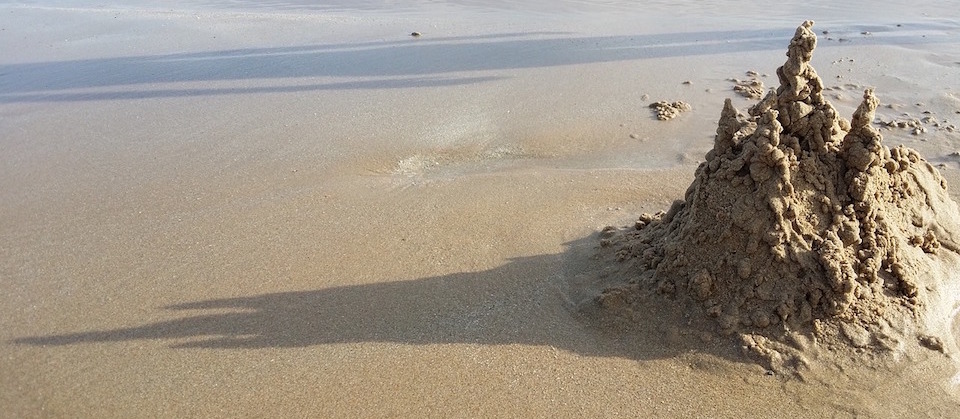Knowledge Entropy, Castles Made of Sand
— 18th July 2017
One of those where you just want to a get a bunch of ideas out of your head. Coherence may vary.

1.
We try and solve problems. Sometimes we succeed, but in an ever changing environment problems don’t stay solved and new problems emerge quickly. The best response to this is to keep your solutions minimal and flexible, focus on continuous learning and never expect to be “done”.
This means less planning and more delivery. It means not expecting to get it right first time. Or second time, or ever. There’s no point of perfection. You’re never finished. It is just a continual process of change, adaptation and improvement.
If you are walking along a never ending road, no matter how far you travel, proportionately you are at still at the the beginning. That’s a strange feeling, but it’s one we need to get used to. We need to focus on the progress we make without expecting that progress to lead to a conclusion.
But progress is only possible through learning. Learning is only possible when you have access to – and the chance to understand – what people have learned before.
2.
Knowledge is sand. It piles up in corners and gathers between your toes. Often from a distance it’s hard to tell how one bit is different from another. It’s hard to grasp a lot of it at once. Sometimes the more you try and hold the more you drop. It slips between your fingers.
One of the best ways to prevent this happening is to gather the bits together and give them shape. To build something out of all those tiny granules which people can appreciate and understand as a thing in itself. That way they no longer have to understand each individual grain of knowledge, they can instead focus on the whole.
By embedding knowledge into things in this way we can allow the people who come after us to progress. To build on to top of what we’ve done rather than repeating our work through not noticing or recognising what it is.
We have to remember though that sand does not maintain its shape for long. Like castles on a beach the sun dries them, the wind erodes them, and eventually the tide comes in. You return later to find them in ruins.
Constant attention is needed to maintain, rebuild and shield them. Without this they will disappear.
3.
But castles of sand don’t get constant attention. They are fun to build and look nice when they’re done (see how we fall into the “done” trap again). No one wants to maintain a sandcastle.
Instead of sandcastles we need tools. Tools that people use. A useful tool gets constant attention and if it’s useful enough those people who make use of it will want to maintain it and keep it in good working order. They will care for it, and look after it and above all they’ll improve it. Constantly.
What we need to do is to find ways of gathering the knowledge we have but into useful everyday tools that people can use to get things done. And that they can build upon.
If we can do this then their impermanent nature becomes an advantage. It forces us to make them useful and usable because that's the only way they will get enough attention to endure. Constant renewal not only maintains their usefulness but reinvents it and adapts it to future needs. People can incorporate new knowledge and allow old or out-of-date knowledge to fall away. Each tool becomes and endless road of its own.
4.
Look around you. How much of the knowledge being generated is sat in piles. Hidden in corners. Stuck between your (metaphorical) toes? How much of it is scattered underfoot or neatly swept out of the way? How much of is it invisible? How much do you maybe not even know about? What would it take to bring some of it out into the light and to turn it into a tool you could use?
5.
I know what you’re thinking. “Tools made of sand? That’s ridiculous!”.
You’re probably right.
